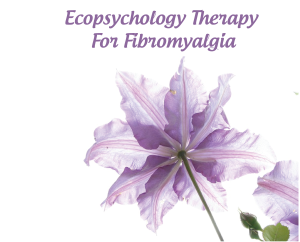Ecopsychology Therapy For Fibromyalgia
 Even though there is currently no cure that exists for fibromyalgia there is still hope for you. Education, lifestyle changes, natural and sometimes medicinal treatments can help you regain control of your life and achieve significant improvements. When you can fully understand the nature of this disease, you are more likely to take an active role in managing fibro.
Even though there is currently no cure that exists for fibromyalgia there is still hope for you. Education, lifestyle changes, natural and sometimes medicinal treatments can help you regain control of your life and achieve significant improvements. When you can fully understand the nature of this disease, you are more likely to take an active role in managing fibro.
Today we are sharing another treatment option to consider. I personally don’t know much about this treatment option but several people have messaged me about it so I thought I would at least share what I have found. Please do your own research and due diligence before starting any new treatment.
Ecopsychology Therapy For Fibromyalgia
The word Ecopsycholgy is alive with meaning. The term ‘eco’ is a Greek word that translates as ‘our living, breathing environment’ while ‘psycho’ refers to ‘the soul,’ and ‘ology’ means ‘to study or gain knowledge.’ When we work holistically, we work with our body, mind, emotions, and spirit in an integrated, balanced way. Energy Medicine is an intricate, multi-leveled approach that supports self-awareness and change in the healing process.
Ecopsychology is concerned with the relationship between people and the natural environment. Although we tend to think of our psyche as something separate from nature, an ecopsychologist views this perceived split between mind and nature as the source of our present eccological problems.
Ecotherapy is an overlap of ecopsychology and psychotherapy. Ecotherapists facilitate their clients’ connection with the natural world to help them connect with their inner nature. By developing environmental awareness and respect, people learn to take better care of themselves.
Practices used in ecopsychology range widely and may include: mindfulness practice while in a natural environment where one pays attention to the sensory experience of nature, vision quests where one spends several days immersed in Nature, spending more intentional time in a Nature, and using Nature as a metaphor.
There are Eight Principles of Ecopsychology
- In ecopsychology, the mind’s core is believed to be the ecological unconscious, that part of our unconscious mind that is inherently connected to the cosmic and planetary nature we are a part of. It contains the record of our evolution.
- Life and mind have emerged from the evolution of natural systems, starting with the physical and going through the biological, mental, and then to the cultural systems we have today. All of these aspects of our universe need to be real to our experience.
- Ecopsychology’s aim is to awaken an individual’s innate sense of their reciprocal relationship to the environment, to heal the alienation from nature that is apparent in our urban mind-set.
- Babies arrive into this world naturally enchanted by nature. Ecopsychology attempts to help adults rediscover this quality of experience through various traditional healing methods, nature mysticism as found in art and religion, by experiencing the wilderness, and contemplating ecological insights. This helps people develop an ecological ego (self).
- Ecological egos, as they mature, develop a sense of ecological responsibility that colors their social and political activities.
- Ecopsychology draws on concepts from ecofeminism, or the care and nurturing of our environment, to counter the masculine attitude of dominance that currently pervades political and business decisions affecting our natural world.
- Ecopsychology is not anti-industrial but is post-industrial, meaning although the wisdom of large urban-industrial culture complexes is questioned, technological advancements that enhance life are welcome.
- An ecopsycologist will tell you that there is a “synergistic interplay” between our personal well being and planetary well being. It follows then that what is good for the planet is good for the person, and our individual rights also belong to the planet.
Outcomes of ecotherapy
Research citing the potential healing aspects of a wide range of projects in ecotherapy has been published extensively in medical, leisure, psychological and other journals. This includes studies on the wellness and psychological benefits of time in the wilderness, transformational rites of passage experiences, involvement in conservation projects and contact with wildlife and smaller animals.
To engage in ecopsychology, there are many simple things that can be done, either as a group or alone. Simply taking a walk through a park whilst being mindful and respectful of the environment is a good start. Even camping could be considered ecopsychology under the right circumstances!
Always make sure you check out any practitioner you find, meet with them, interview them and other patients ahead of time if possible, look them up with the BBB and do internet searches.
Sources: dawnns-fibroblog.blogspot.com, drjaneely.net/the-benefits-of-energy-medicine-and-ecopsychology, nepeannaturopathic.com.au/wp/ecopsychology-inner-nature, Ecopsychology and Inner Nature. www.wellbeing.com.au. November 30th, 2009.



